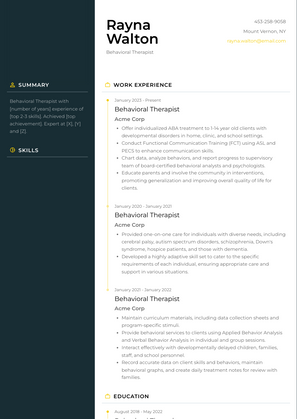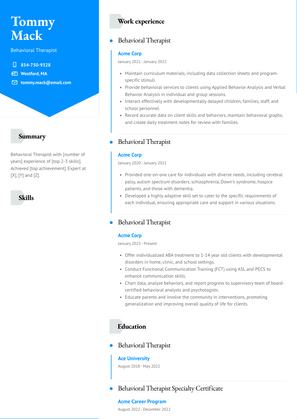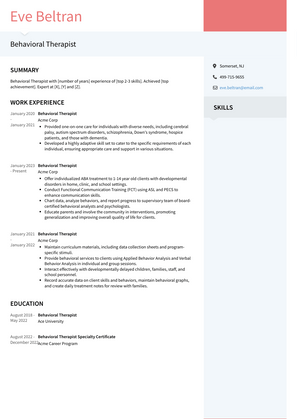3+ Behavioral Therapist Resume Examples and Templates
This page provides you with Behavioral Therapist resume samples to use to create your own resume with our easy-to-use resume builder. Below you'll find our how-to section that will guide you through each section of a Behavioral Therapist resume.



How to Write a Behavioral Therapist Resume?
To write a professional Behavioral Therapist resume, follow these steps:
- Select the right Behavioral Therapist resume template.
- Write a professional summary at the top explaining your Behavioral Therapist’s experience and achievements.
- Follow the STAR method while writing your Behavioral Therapist resume’s work experience. Show what you were responsible for and what you achieved as {a/an} Behavioral Therapist.
- List your top Behavioral Therapist skills in a separate skills section.
How to Write Your Behavioral Therapist Resume Header?
Write the perfect Behavioral Therapist resume header by:
- Adding your full name at the top of the header.
- Add a photo to your resume if you are applying for jobs outside of the US. For applying to jobs within the US, avoid adding photo to your resume header.
- Add your current Behavioral Therapist to the header to show relevance.
- Add your current city, your phone number and a professional email address.
- Finally, add a link to your portfolio to the Behavioral Therapist resume header. If there’s no portfolio link to add, consider adding a link to your LinkedIn profile instead.
Bad Behavioral Therapist Resume Example - Header Section
Mylee 9507 Morris Street Somerset, NJ 08873 Marital Status: Married, email: cooldude2022@gmail.com
Good Behavioral Therapist Resume Example - Header Section
Mylee Walters, Somerset, NJ, Phone number: +1-555-555-5555, Link: linkedin/in/johndoe
Make sure to add a professional looking email address while writing your resume header. Let’s assume your name is John Doe - here is a formula you can use to create email addresses:
- firstnamelastname@email.com - johndoe@email.com
- firstname.lastname@email.com - john.doe@email.com
- lastname.firstname@email.com - doe.john@email.com
- f.lastname@email.com - j.doe@email.com
- l.firstname@email.com - d.john@email.com
- firstnamelastname12@email.com - johndoe12@email.com
For a Behavioral Therapist email, we recommend you either go with a custom domain name (john@johndoe.com) or select a very reputed email provider (Gmail or Outlook).
How to Write a Professional Behavioral Therapist Resume Summary?
Use this template to write the best Behavioral Therapist resume summary: Behavioral Therapist with [number of years] experience of [top 2-3 skills]. Achieved [top achievement]. Expert at [X], [Y] and [Z].
How to Write a Behavioral Therapist Resume Experience Section?
Here’s how you can write a job winning Behavioral Therapist resume experience section:
- Write your Behavioral Therapist work experience in a reverse chronological order.
- Use bullets instead of paragraphs to explain your Behavioral Therapist work experience.
- While describing your work experience focus on highlighting what you did and the impact you made (you can use numbers to describe your success as a Behavioral Therapist).
- Use action verbs in your bullet points.
Behavioral Therapist Resume Example
__Behavioral Therapist
- Employed Applied Behavioral Analysis (ABA) techniques to assist children with Autism in social integration.
- Utilized Discrete Trial Training (DTT) and Natural Environment Teaching (NET) to achieve language and social interaction goals.
- Focused on aligning children with Autism with their neurotypical peers by targeting expected age developments.
Behavioral Therapist Resume Example
Behavioral Therapist
- Offer individualized ABA treatment to 1-14 year old clients with developmental disorders in home, clinic, and school settings.
- Conduct Functional Communication Training (FCT) using ASL and PECS to enhance communication skills.
- Chart data, analyze behaviors, and report progress to supervisory team of board-certified behavioral analysts and psychologists.
- Educate parents and involve the community in interventions, promoting generalization and improving overall quality of life for clients.
Behavioral Therapist Resume Example
Behavioral Therapist
- Applied Discrete Trial Training (DTT) and Natural Environment Training (NET) techniques to teach language, play, and self-help skills.
- Replaced problem behavior with appropriate skills and practiced social skills with peers in a supportive environment.
- Prepared patients for one-on-one and group settings, facilitating regular evaluations by registered behavior technicians.
- Conducted weekly parent training for in-home coaching, supporting children in achieving individualized developmental goals in communication, behavior, and self-help skills.
- Center-Based therapy allowed children to practice school readiness, peer play, and social skills in a structured environment.
Behavioral Therapist Resume Example
Behavioral Therapist
- Maintain curriculum materials, including data collection sheets and program-specific stimuli.
- Provide behavioral services to clients using Applied Behavior Analysis and Verbal Behavior Analysis in individual and group sessions.
- Interact effectively with developmentally delayed children, families, staff, and school personnel.
- Record accurate data on client skills and behaviors, maintain behavioral graphs, and create daily treatment notes for review with families.
Behavioral Therapist Resume Example
Behavioral Therapist
- Provided one-on-one care for individuals with diverse needs, including cerebral palsy, autism spectrum disorders, schizophrenia, Down's syndrome, hospice patients, and those with dementia.
- Developed a highly adaptive skill set to cater to the specific requirements of each individual, ensuring appropriate care and support in various situations.
Top Behavioral Therapist Resume Skills for 2023
- Cognitive Behavioral Therapy (CBT)
- Applied Behavior Analysis (ABA)
- Behavior Modification
- Functional Behavior Assessment (FBA)
- Positive Reinforcement Techniques
- Behavioral Interventions
- Social Skills Training
- ABA Data Collection
- Verbal Behavior Therapy
- Token Economy Systems
- Discrete Trial Training (DTT)
- Precision Teaching
- Behavioral Contracting
- Task Analysis
- Relaxation Techniques
- Desensitization Therapy
- Behavioral Assessment
- Behavioral Consultation
- Behavioral Parent Training
- Behavioral Health Assessments
- Behavioral Therapy for Anxiety Disorders
- Behavioral Therapy for Depression
- Behavioral Therapy for ADHD
- Behavioral Therapy for Autism Spectrum Disorders
- Behavioral Therapy for Obsessive-Compulsive Disorder (OCD)
- Behavioral Therapy for Trauma
- Behavioral Therapy for Eating Disorders
- Behavioral Therapy for Substance Abuse
- Applied Verbal Behavior (AVB)
- Behavioral Intervention Plans (BIP)
- Reinforcement Schedules
- Functional Communication Training (FCT)
- Behavioral Crisis Management
- Self-Monitoring Strategies
- Observational Learning Techniques
- Motivational Interviewing
- Behavioral Activation Therapy
- Trauma-Informed Care
- Behavioral Health Counseling
- Mindfulness-Based Behavioral Therapy
- Behavioral Assessment Tools (e.g., ABC Chart, Scatterplot)
- Behavioral Therapy for Anger Management
- Behavioral Therapy for Phobias
- Behavioral Therapy for Sleep Disorders
- Behavioral Therapy for Post-Traumatic Stress Disorder (PTSD)
- Behavioral Therapy for Personality Disorders
What Do Hiring Managers Look For in a Behavioral Therapist Resume?
‣ Empathy and Patience:
- Behavioral therapists need to exhibit genuine empathy and patience when working with clients, understanding their emotions and challenges to provide compassionate and effective therapy.
- Practicing active listening skills to understand clients' concerns, thoughts, and feelings, which helps in tailoring therapy sessions and interventions according to their specific needs.
- Assessing clients' behavior, identifying patterns, and analyzing root causes of issues to develop customized treatment plans and behavioral interventions.
- Excellent verbal and nonverbal communication skills are essential for explaining therapy techniques, setting goals, and maintaining a strong therapeutic relationship with clients and their families.
How Long Should my Behavioral Therapist Resume be?
Your Behavioral Therapist resume length should be less than one or two pages maximum. Unless you have more than 25 years of experience, any resume that’s more than two pages would appear to be too long and risk getting rejected.
On an average, for Behavioral Therapist, we see most resumes have a length of 2. And, that’s why we advise you to keep the resume length appropriate to not get rejected.
Frequently Asked Questions (FAQs) for Behavioral Therapist Resume
-
What does a Behavioral Therapist do?
- A Behavioral Therapist works with individuals, typically children or adults with behavioral or developmental disorders, to address problematic behaviors and improve social, communication, and coping skills. They use various therapeutic techniques, such as Applied Behavior Analysis (ABA), to assess behavior, develop treatment plans, and implement interventions.
-
What qualifications are important for a Behavioral Therapist position?
- Qualifications typically include a bachelor's or master's degree in psychology, counseling, social work, or a related field, along with relevant certifications or licensure depending on the state requirements. Strong interpersonal skills, empathy, patience, and knowledge of behavioral therapy techniques are essential.
-
What kind of experience should a Behavioral Therapist highlight on their resume?
- Experience in providing behavioral therapy services to individuals with autism spectrum disorder (ASD), attention deficit hyperactivity disorder (ADHD), anxiety disorders, or other behavioral challenges is crucial for a Behavioral Therapist. Highlighting proficiency in conducting assessments, developing behavior plans, and implementing evidence-based interventions can demonstrate relevant experience.
-
How important is it for a Behavioral Therapist to demonstrate empathy on their resume?
- Empathy is vital for a Behavioral Therapist as they work closely with individuals and families facing behavioral challenges. Highlighting experience in building rapport with clients, understanding their perspectives, and providing compassionate support can demonstrate strong empathy skills.
-
Should a Behavioral Therapist include their experience with behavior assessment tools on their resume?
- Yes, mentioning experience with behavior assessment tools such as functional behavior assessments (FBA), behavior rating scales, or standardized assessments can demonstrate the Therapist's ability to assess behavior patterns, identify triggers, and develop targeted interventions.
-
What soft skills are important for a Behavioral Therapist to highlight on their resume?
- Soft skills such as communication, active listening, collaboration, adaptability, and problem-solving are crucial for a Behavioral Therapist. These skills contribute to building trust with clients, collaborating with multidisciplinary teams, and addressing behavioral challenges effectively.
-
Is it necessary for a Behavioral Therapist to mention their experience with parent training on their resume?
- Yes, mentioning experience with parent training sessions, caregiver education, or family counseling can demonstrate the Therapist's ability to empower families to support behavioral interventions at home and promote positive behavior change.
-
How should a Behavioral Therapist tailor their resume for different client populations or treatment settings?
- A Behavioral Therapist should highlight experience and skills relevant to the specific client populations or treatment settings they have worked with, whether it's children with ASD, adults with mood disorders, or individuals in clinical or school-based settings. Emphasizing familiarity with evidence-based interventions, treatment planning approaches, and population-specific needs can be beneficial.
-
Should a Behavioral Therapist include their educational background on their resume?
- Yes, including educational background such as degrees, certifications, or relevant coursework related to psychology, counseling, or behavioral therapy is important. This provides credibility and demonstrates the foundational knowledge necessary for the role.
-
How can a Behavioral Therapist make their resume visually appealing and easy to read?
- Utilizing clear headings, bullet points to highlight key skills and experiences, and a professional layout are important aspects of resume formatting. Additionally, including specific examples of successful behavioral intervention strategies, any relevant certifications or awards, or extracurricular involvement can enhance the overall presentation of the resume.
Copyright ©2025 Workstory Inc.
